哈尔滨市初中英语语法知识—情态动词的知识点训练
初中英语语法之情态动词用法及练习题(含答案)
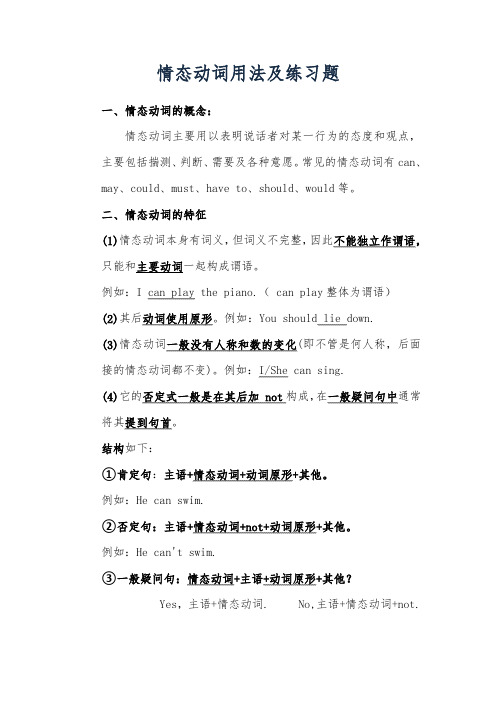
情态动词用法及练习题一、情态动词的概念:情态动词主要用以表明说话者对某一行为的态度和观点,主要包括揣测、判断、需要及各种意愿。
常见的情态动词有can、may、could、must、have to、should、would等。
二、情态动词的特征(1)情态动词本身有词义,但词义不完整,因此不能独立作谓语,只能和主要动词一起构成谓语。
例如:I can play the piano.( can play整体为谓语)(2)其后动词使用原形。
例如:You should lie down.(3)情态动词一般没有人称和数的变化(即不管是何人称,后面接的情态动词都不变)。
例如:I/She can sing.(4)它的否定式一般是在其后加 not构成,在一般疑问句中通常将其提到句首。
结构如下:①肯定句:主语+情态动词+动词原形+其他。
例如:He can swim.②否定句:主语+情态动词+not+动词原形+其他。
例如:He can't swim.③一般疑问句:情态动词+主语+动词原形+其他?Yes,主语+情态动词. No,主语+情态动词+not.例如:-Can he swim?-Yes, he can. No,he can’t.④特殊疑问句:特殊疑问词+情态动词+主语+动词原形+其他? 例如: -What can he do ?-He can swim.三.情态动词的用法(1)can的用法①表示“能力”Can you sing?你会唱歌吗?②表示客观条件允许You can listen to music here.你可以在这里听音乐。
You can’t park your car here. 你不能在此停车③can用在否定句和疑问句中时,有时表示说话人的怀疑、惊异、或猜测:It can’t be true.这不可能是事实Can it be true?这可能是真的吗?④.can的搭配用法:A.as +adj./adv.+as one can/could “尽可能,尽量……”,如:The man took his child to the hospital as quickly as he could.这个男人尽可能快地将孩子送去医院。
中学情态动词总复习

中学情态动词总复习情态动词是英语中的一类特殊动词,常常用于表示能力、可能性、愿望、推测等的意思。
本文将总结中学阶段研究的常见情态动词及其用法,帮助学生巩固相关知识。
1.情态动词的基本特点在句中用作实义动词的补充,表示某种能力、可能性、愿望等。
情态动词后面直接接动词原形,不加其他任何词。
情态动词没有人称和数的变化,也没有时态和语态的变化。
2.常见情态动词及其用法2.1 Can表示能力或许可。
肯定句:主语 + can + 动词原形。
否定句:主语 + can't + 动词原形。
疑问句:Can + 主语 + 动词原形?2.2 Could表示过去或现在的能力、请求、许可或推测。
肯定句:主语 + could + 动词原形。
否定句:主语 ___ 动词原形。
疑问句:Could + 主语 + 动词原形?2.3 May表示允许、请求、许可或可能性。
肯定句:主语 + may + 动词原形。
否定句:主语 + may not + 动词原形。
疑问句:May + 主语 + 动词原形?2.4 Might表示可能性或婉转的请求。
肯定句:主语 + might + 动词原形。
否定句:主语 + might not + 动词原形。
疑问句:Might + 主语 + 动词原形?2.5 Must表示必须、肯定性推测或强烈的意愿。
肯定句:主语 + must + 动词原形。
否定句:主语 + must not + 动词原形。
疑问句:Must + 主语 + 动词原形?2.6 Shall表示建议、命令、威胁或询问意愿。
肯定句:主语 + shall + 动词原形。
否定句:主语 + shall not + 动词原形。
疑问句:Shall + 主语 + 动词原形?2.7 Should表示应该、建议或推测。
肯定句:主语 + should + 动词原形。
否定句:主语 ___ 动词原形。
疑问句:Should + 主语 + 动词原形?总结上述是中学阶段常见的情态动词及其用法。
初中情态动词知识点及习题(附答案)
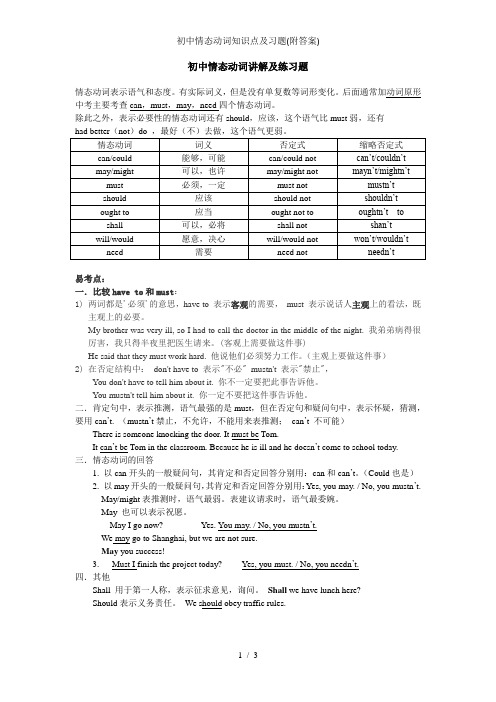
初中情态动词讲解及练习题情态动词表示语气和态度。
有实际词义,但是没有单复数等词形变化。
后面通常加动词原形中考主要考查can,must,may,need四个情态动词。
除此之外,表示必要性的情态动词还有should,应该,这个语气比must弱,还有易考点:一.比较have to和must:1) 两词都是'必须'的意思,have to表示客观的需要,must 表示说话人主观上的看法,既主观上的必要。
My brother was very ill, so I had to call the doctor in the middle of the night.我弟弟病得很厉害,我只得半夜里把医生请来。
(客观上需要做这件事)He said that they must work hard.他说他们必须努力工作。
(主观上要做这件事)2) 在否定结构中:don't have to 表示"不必" mustn't表示"禁止",You don't have to tell him about it. 你不一定要把此事告诉他。
You mustn't tell him about it. 你一定不要把这件事告诉他。
二.肯定句中,表示推测,语气最强的是must,但在否定句和疑问句中,表示怀疑,猜测,要用can’t. (mustn’t禁止,不允许,不能用来表推测;can’t 不可能)There is someone knocking the door. It must be Tom.It can’t be Tom in the classroom. Because he is ill and he doesn’t come to school today.三.情态动词的回答1. 以can开头的一般疑问句,其肯定和否定回答分别用:can和can’t。
中考英语情态动词考点总结与归纳
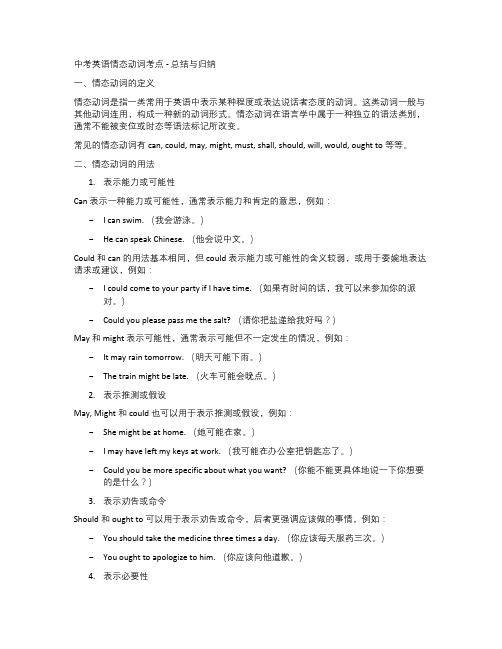
中考英语情态动词考点 - 总结与归纳一、情态动词的定义情态动词是指一类常用于英语中表示某种程度或表达说话者态度的动词。
这类动词一般与其他动词连用,构成一种新的动词形式。
情态动词在语言学中属于一种独立的语法类别,通常不能被变位或时态等语法标记所改变。
常见的情态动词有 can, could, may, might, must, shall, should, will, would, ought to 等等。
二、情态动词的用法1.表示能力或可能性Can 表示一种能力或可能性,通常表示能力和肯定的意思,例如:-I can swim. (我会游泳。
)-He can speak Chinese. (他会说中文。
)Could 和 can 的用法基本相同,但 could 表示能力或可能性的含义较弱,或用于委婉地表达请求或建议,例如:-I could come to your party if I have time. (如果有时间的话,我可以来参加你的派对。
)-Could you please pass me the salt? (请你把盐递给我好吗?)May 和 might 表示可能性,通常表示可能但不一定发生的情况,例如:-It may rain tomorrow. (明天可能下雨。
)-The train might be late. (火车可能会晚点。
)2.表示推测或假设May, Might 和 could 也可以用于表示推测或假设,例如:-She might be at home. (她可能在家。
)-I may have left my keys at work. (我可能在办公室把钥匙忘了。
)-Could you be more specific about what you want? (你能不能更具体地说一下你想要的是什么?)3.表示劝告或命令Should 和 ought to 可以用于表示劝告或命令,后者更强调应该做的事情,例如:-You should take the medicine three times a day. (你应该每天服药三次。
初中英语语法情态动词讲解与练习有答案
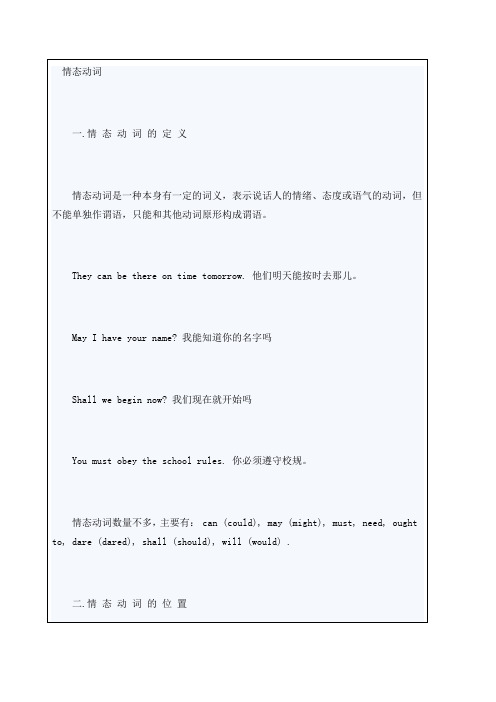
情态动词在句中放在谓语动词之前,谓语动词前若有助动词,则在助动词之前,疑问句中,情态动词放在主语之前。
I can see you. Come here. 我能看见你,过来吧。
He must have been away. 他一定走了。
What can I do for you? 你要什么How dare you treat us like that! 你怎么敢那样对待我们!三.情态动词的特点情态动词无人称和数的变化,情态动词后面跟的动词需用原形,否定式构成是在情态动词后面加“not”。
个别情态动词有现在式和过去式两种形式,过去式可以用来表达更加客气、委婉的语气,时态性不强,可用于过去,现在或将来。
我们称之为“功能用法”。
He could be here soon. 他很快就来。
May I come in? 我可以进来吗?May I use your dictionary? 我可以用你的词典吗?You may put on more clothes. 你可以多穿点衣服。
He said he might lend us some money. 他说他可以借给我们一些钱。
may 否定式为 may not, 缩写形式是mayn’t。
might 是may 的过去式,有两种用法,一种表示过去式,一种表示虚拟语气,使语气更加委婉、客气或对可能性的怀疑。
He told me he might be here on time. 他说他能按时间来。
Might I borrow some money now? 我可以借点钱吗?He might be alive. 他可能还活着。
3. must “必须;应该;一定;准是”,表示说话人认为有必要做某事,命令、You needn't have taken it seriously. 这件事情你不必太认真。
5. dare “敢”,多用在否定或疑问句中。
The little girl dare not speak in public. 小女孩不敢在公众面前说话。
初中英语情态动词详细用法归纳含练习及答案

初中英语情态动词具体用法归纳〔含练习及答案〕情态动词有具体的词义,但也同助动词一样,须要及其他词语一起构成句子的谓语,另外情态动词没有人称和数的改变,情态动词后必需跟动词原形。
1. 的用法:〔1〕.表示实力、答应、可能性。
表示实力时一般译为“能、会〞,即有种实力,尤其是生来具备的实力.如:, I ’t . 她能游得很快,但我不能。
I . 我用眼睛看。
是的过去式。
表示过去的实力。
. 经常指经过努力,花费了时间和劳力之后才能做到某事。
.〔2〕.表示答应,常在口语中。
如: . 你可以用我的字典。
〔3〕.表示推想,可能性,意为“可能〞,常用于否认句和疑问句中,此时’t 译为“ 不行能〞。
如: ? 这个消息会是真的吗?— ?那个人有可能是我们老师吗?—, ’t . a .不行能。
咱们老师正在巡游长城呢。
【例题】—I . . —. , I . ’t ’t ’t ’t【解析】依据下文“我刚去过那儿〞可知,应为“ 不行能〞,’t 表示推想[答案] A的用法:〔1〕的过去式,意为“ 能、会〞,表示过去的实力。
如: 10. 他十岁时就会写诗。
〔2〕. 在疑问句中,表示委婉的语气,此时没有过去式的意思。
如a ? 你能帮我个忙吗?— I ? 我能用一下你的钢笔吗? —, .可以。
〔用问,不能用答。
〕2. 的用法:〔1〕.表示恳求、答应,比正式,如: I ? 我可以借你的自行车吗? . 如今你可以回家了。
【例题】— I 3? — . . A. D.【解析】在此处表示恳求,意为“ 做……可以吗〞。
答案:A(2) .表示推想,议论可能性,意为“ 可能,或许〞,一般用于确定句中。
如: . 明天可能会下雨。
. 她可能在家呢. 翻译为“可能不〞(3) 的过去式为,表示推想时。
可能性低于。
如: . .他分开学校了,可能是他生病了。
(4) . 表示盼望、祈求、祝福,常可译为“祝福〞。
通常是用 +主例如: a . 祝你过得开心。
! 祝你华蜜!!祝你胜利!3. 的用法:(1) 表示主观看法,意为“必需、确定〞。
初中易考知识点情态动词的用法
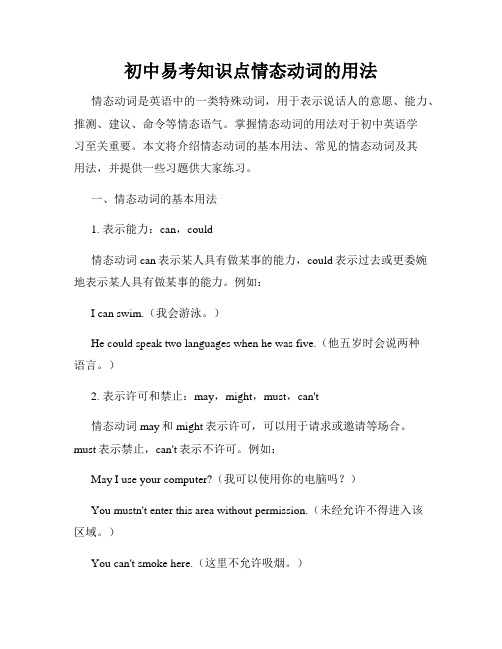
初中易考知识点情态动词的用法情态动词是英语中的一类特殊动词,用于表示说话人的意愿、能力、推测、建议、命令等情态语气。
掌握情态动词的用法对于初中英语学习至关重要。
本文将介绍情态动词的基本用法、常见的情态动词及其用法,并提供一些习题供大家练习。
一、情态动词的基本用法1. 表示能力:can,could情态动词can表示某人具有做某事的能力,could表示过去或更委婉地表示某人具有做某事的能力。
例如:I can swim.(我会游泳。
)He could speak two languages when he was five.(他五岁时会说两种语言。
)2. 表示许可和禁止:may,might,must,can't情态动词may和might表示许可,可以用于请求或邀请等场合。
must表示禁止,can't表示不许可。
例如:May I use your computer?(我可以使用你的电脑吗?)You mustn't enter this area without permission.(未经允许不得进入该区域。
)You can't smoke here.(这里不允许吸烟。
)3. 表示推测:may,might,could情态动词may,might和could可用于表示可能性或推测。
其中,may用于肯定句,might和could用于疑问句或否定句。
例如:She may be at home.(她可能在家。
)Might it rain tomorrow?(明天可能会下雨吗?)He could have forgotten his keys.(他可能忘记带钥匙了。
)4. 表示建议和命令:should,ought to,must情态动词should和ought to表示建议或提议,must表示命令或强烈推测。
例如:You should study harder for the exam.(你应该更加努力地学习考试。
初中英语一轮专项复习归纳之情态动词知识点归纳
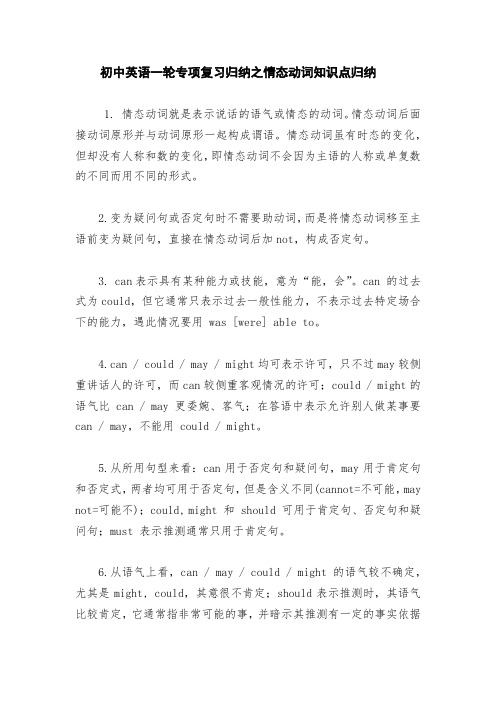
初中英语一轮专项复习归纳之情态动词知识点归纳1. 情态动词就是表示说话的语气或情态的动词。
情态动词后面接动词原形并与动词原形一起构成谓语。
情态动词虽有时态的变化,但却没有人称和数的变化,即情态动词不会因为主语的人称或单复数的不同而用不同的形式。
2.变为疑问句或否定句时不需要助动词,而是将情态动词移至主语前变为疑问句,直接在情态动词后加not,构成否定句。
3. can表示具有某种能力或技能,意为“能,会”。
can 的过去式为could,但它通常只表示过去一般性能力,不表示过去特定场合下的能力,遇此情况要用 was [were] able to。
4.can / could / may / might均可表示许可,只不过may较侧重讲话人的许可,而can较侧重客观情况的许可;could / might的语气比can / may更委婉、客气;在答语中表示允许别人做某事要can / may,不能用 could / might。
5.从所用句型来看:can用于否定句和疑问句,may用于肯定句和否定式,两者均可用于否定句,但是含义不同(cannot=不可能,may not=可能不);could, might 和 should 可用于肯定句、否定句和疑问句;must 表示推测通常只用于肯定句。
6.从语气上看,can / may / could / might 的语气较不确定,尤其是might, could,其意很不肯定;should表示推测时,其语气比较肯定,它通常指非常可能的事,并暗示其推测有一定的事实依据或者合乎常理;must 表示推测的语气最肯定。
7. shall 除用于第一人称表示单纯将来外,还可用于陈述句第二、三人称, 表示说话者的意图、警告、命令、决心等。
will 可以表示习惯和倾向性,意为“惯于, 老是, 终归是”,Shall I (we)…? 可用于征求意见等,Will you…?可用于表示请求或邀请等。
九年级英语情态动词知识点梳理及经典练习(超详细)

九年级英语情态动词知识点梳理及经典练习(超详细)一、初中英语情态动词1.—We've got everything ready for the picnic.—Do you mean I __________ bring anything with me?A. can'tB. mustn'tC. couldn'tD. needn't【答案】 D【解析】【分析】句意:—我们已经为野餐准备好了一切。
—你的意思是我不必带任何东西吗?A. can't 不能;B. mustn't 表示禁止,一定不要;C. couldn't不能,表示过去时态;D. needn't不必。
结合句意,故选D。
【点评】本题考查情态动词的用法。
2.—That must be Mr. John.—No, it be him. I saw him off at the airport half an hour ago.A. may notB. mustn'tC. can'tD. needn't【答案】 C【解析】【分析】句意:——那一定是约翰先生。
——不,不可能是他。
我看见他在半小时前到达机场。
nay not可能不是;mustn't一定不是;can't不可能是;needn't不必,英语中,肯定的推测用must;否定的推测用can't。
依据 I saw him off at the airport half an hour ago. 可知不可能是他,所以应该是否定的推测,故选C。
【点评】此题考查情态动词。
弄清每个情态动词的使用规则。
根据语境和上下文的联系确定所使用的情态动词。
3.—I missed last night's Everlasting Classics(《经典咏流传》)!—You care. You can watch it online later.A. mustn'tB. can'tC. may notD. needn't【答案】 D【解析】【分析】句意:——我错过了昨晚的《经典咏流传》!——你不必在意,以后你可以上网看。
初中英语情态动词详细用法归纳含练习及答案

初中英情用法(含及答案)考点一: can, may , must等情在述句中的用法:1. can 的用法:( 1).表示能力、可、可能性。
表示能力一般“能、会”,即有种能力,特别是生来具的能力 .如: She can swim fast, but I can’能她t.游得很快,但我不可以。
I can see with my eyes. 我用眼睛看。
could 是 can 的去式。
表示去的能力。
be able to do sth. 经常指努力,花了和力以后才能做到某事。
is/am/are able to do sthwas/were able to do sth.(2) .表示可,常在口中。
如: You can use my dictionary.你能够用我的词典。
( 3).表示推,可能性,意“可能”,常用于否认句和疑句中,此can’t“ 不可以能”。
如:Can the news be true? 个信息会是真的?— Can it be our teacher?那个人有可能是我老?— No, it can ’t be our teacher. He is on a visit to the Great Wall不可以.能。
咱老正在游城呢。
【例】— I think Miss Gao must be in the library. She said she would go there.—No. She __be there, I have just been there. A.can ’ t B.mustn ’ tC.needn ’ tD.wouldn ’t【分析】依据下文“我去那边”可知,“ 不可以能”,can’t表示推[答案] A could 的用法:(1).can 的去式,意“能、会”,表示去的能力。
如:He could write poems when he was 10. 他十就会写。
( 2) . could 在疑句中,表示委宛的气,此could 没有去式的意思。
七年级情态动词掌握知识点
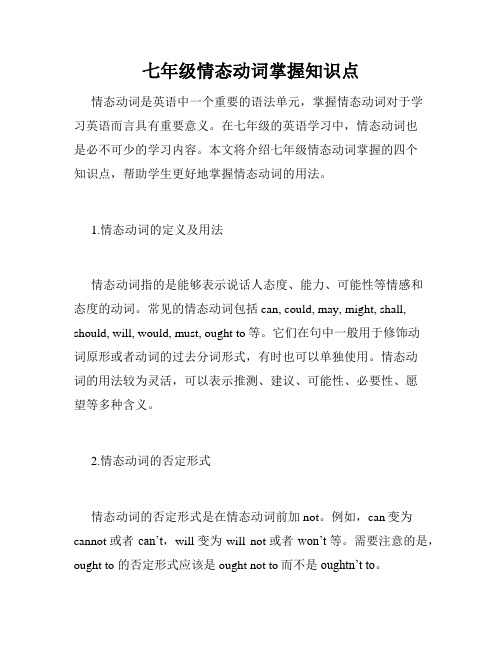
七年级情态动词掌握知识点情态动词是英语中一个重要的语法单元,掌握情态动词对于学习英语而言具有重要意义。
在七年级的英语学习中,情态动词也是必不可少的学习内容。
本文将介绍七年级情态动词掌握的四个知识点,帮助学生更好地掌握情态动词的用法。
1.情态动词的定义及用法情态动词指的是能够表示说话人态度、能力、可能性等情感和态度的动词。
常见的情态动词包括can, could, may, might, shall, should, will, would, must, ought to等。
它们在句中一般用于修饰动词原形或者动词的过去分词形式,有时也可以单独使用。
情态动词的用法较为灵活,可以表示推测、建议、可能性、必要性、愿望等多种含义。
2.情态动词的否定形式情态动词的否定形式是在情态动词前加not。
例如,can变为cannot或者can’t,will变为will not或者won’t等。
需要注意的是,ought to 的否定形式应该是ought not to而不是oughtn’t to。
3.情态动词的疑问形式情态动词的疑问形式通常是将情态动词放在句首或者将情态动词和主语倒装。
例如,Can you swim?或者Swim can you?都是正确的疑问句。
对于简洁疑问句,我们可以使用情态动词加主语的方式表达,例如Can you swim? 可以缩写为Can you?。
4.情态动词的用法细节情态动词与其他动词不同之处在于它们的用法比较特殊。
例如,情态动词不能进行时态的变化,也不能用于被动语态。
此外,情态动词的用法也存在着一些细节问题,需要学生在学习中注意掌握。
比如should用于表达建议、义务和责任,而ought to则用于表达道德、责任和义务;can和may都可以用于表示可能性,但是may的语气更加委婉,而can则更加直接。
总之,在七年级的英语学习中,情态动词是非常重要的语法内容。
学生应该深入理解情态动词的含义,掌握情态动词的用法及其注意事项。
初中英语情态动词详细用法归纳(含练习及答案)
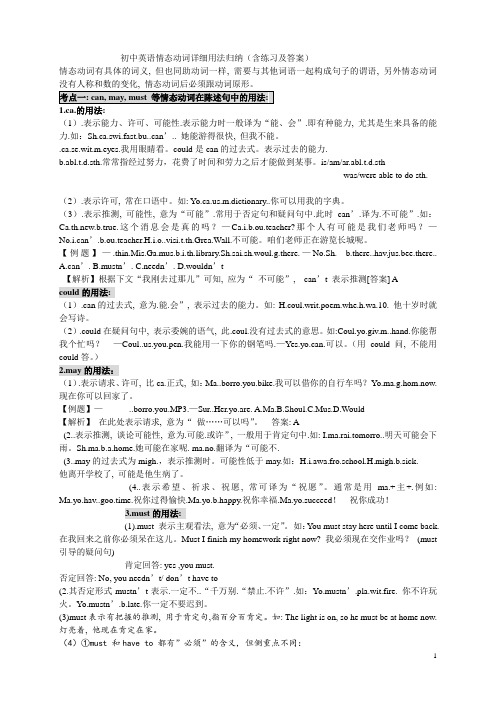
初中英语情态动词详细用法归纳(含练习及答案)情态动词有具体的词义, 但也同助动词一样, 需要与其他词语一起构成句子的谓语, 另外情态动词没有人称和数的变化, 情态动词后必须跟动词原形。
1.ca.的用法:(1).表示能力、许可、可能性.表示能力时一般译为“能、会”.即有种能力, 尤其是生来具备的能力.如:Sh.ca.swi.fast.bu..can’.. 她能游得很快, 但我不能。
.ca.se.wit.m.eyes.我用眼睛看。
could是can的过去式。
表示过去的能力.b.abl.t.d.sth.常常指经过努力,花费了时间和劳力之后才能做到某事。
is/am/ar.abl.t.d.sthwas/were able to do sth.(2).表示许可, 常在口语中。
如: .m.dictionary..你可以用我的字典。
(3).表示推测, 可能性, 意为“可能”.常用于否定句和疑问句中.此时can’.译为.不可能”.如:Ca.th.new.b.true.这个消息会是真的吗?—Ca.i.b.ou.teacher?那个人有可能是我们老师吗?—No.i.can’.b.ou.teacher.H.i.o..visi.t.th.Grea.Wall.不可能。
咱们老师正在游览长城呢。
【例题】—.thin.Mis.Ga.mus.b.i.th.library.Sh.sai.sh.woul.g.there.—No.Sh.__b.there..hav.jus.bee.there..A.can’.B.mustn’.C.needn’.D.wouldn’t【解析】根据下文“我刚去过那儿”可知, 应为“不可能”, can’t 表示推测[答案] Acould的用法:(1).can的过去式, 意为.能.会”, 表示过去的能力。
如: H.coul.writ.poem.whe.h.wa.10. 他十岁时就会写诗。
(2).could在疑问句中, 表示委婉的语气, 此.coul.没有过去式的意思。
新初中英语语法知识—情态动词的知识点总复习含答案解析

一、选择题1.—The book report is very important. You ________ write it carefully.—But I ________ hand it in now.A.must; must B.have to; mustC.must; have to D.have to; have to2.—Must I finish the work today, Mum?—No, you ________.You can finish it tomorrow.A.mustn't B.can't C.shouldn't D.needn't3.You have finished most of the work, so you ____ start working so early tomorrow. You may come at 9 :00.A.can't B.mustn't C.needn't D.couldn't4.The designer has tried every possible way to make the robot light, so you _____ worry about its weight.A.must B.may C.can’t D.needn’t5.You______ worry about your lessons. Be careful next time and you will get a good mark. A.don’t need to B.not need C.needn’t to D.don’t need 6.—________your house be cleaned right now?—No,it needn't.It may be cleaned this afternoon.()A.Must B.May C.Can7.---Mum, must I finish my homework today?---No, you . Tomorrow is Sunday and you may have a rest today.A.shouldn’t B.mustn’t C.can’t D.don’t have to 8.A: Is Jim coming by train?B: I’m not sure. He _______ drive his car.A.must B.may C.need D.should 9.—Tom, we’re going shopping at eight, right?—Yeah, but I ______ be a little late, so don’t wait for me.A.may B.should C.mustn’t10.You run with the train when it is comi ng. It’s dangerous.A.may not B.mustn’t C.needn’t11.I see the blackboard. I need to have my glasses.A.can B.can’t C.must D.mustn’t 12.—Must we finish the work right now?—No, you ________. You can do it tomorrow.A.needn’t B.shouldn’t C.mustn’t D.can’t 13.—Must I start now?—No, you_______________.A.mustn't B.can't C.needn't D.must14.The flowers ________ every day, or they will die.A.must water B.can be wateredC.should water D.must be watered15.-_________ you help me with my homework?-Of course if I __________.A.Could; could B.Can't; can C.Could; can D.Can; could 16.When I write down what I am showing thanks to, it’s always for things that money______buy.A.needn’t B.shouldn’t C.may not D.can’t17.— Must I go home? — No, you ________.A.can’t B.mustn’t C.don’t D.needn’t 18.— Will Jim come to Yangzhou for a holiday?— He ________come, it depends on how much homework he will have.A.may B.should C.must D.need 19.—Mum, I’ve signed for a big box by Future Express (快递). What’s in it?—I’m not sure. It ________be a present from your brother.A.need B.must C.may D.will20.—________ David be the new chairperson of the Students’ Union?—He _______ be, but I’m not sure.A.Can; can’t B.Can; mayC.May; must D.May; mustn’t21.Even the top student can't work out this problem, so it________ be too difficult. A.must B.may C.can D.need22.— Mom, I got a big box from express(快递). What is it?—I’m not sure. It ________be a present from your grandmother.A.should B.might C.must D.will【参考答案】***试卷处理标记,请不要删除一、选择题1.C解析:C【解析】【分析】【详解】句意:——这个读书报告很重要。
初中英语语法情态动词讲解加练习

初中英语语法情态动词讲解加练习情态动词讲解一、情态动词的意义:情态动词表示说话人对所说动作的观点。
如需要、可能、意愿、怀疑等。
在形式上,情态动词一般没有人称和数的变化。
有的情态动词没有时态的变化。
情态动词本身词义不完全,不能单独做谓语动词,必须和不带to的动词原形连用。
情态动词的否定式一般是在后边加not构成。
一般疑问句通常将其提到句首。
二、情态动词的用法:一)can, can’t1.can表示能力。
如:We can speak a little English.我们能说一点儿英语。
2. can表示许可。
如:You can play basketball on weekends.周末你可以打篮球。
3. can表示请求。
如:Can you help me with my Chinese?你能帮助我学汉语吗?4. can’t表示否定推测。
如:---Listen! Lee is playing the piano in the room.听!Lee正在房间里弹钢琴。
---It can't be her. She has gone to Beijing.这肯定不是她。
她去了北京。
二)could1. 表示过去的能力。
如:I could swim at the age of four.我在四岁的时候能游泳。
2. 表示委婉的请求。
如:1)Could you please tell me how I can use the computer?请你告诉我怎样使用这台电脑好吗?2)---Could you go with me? 你能和我一块儿去吗?---Sorry, I can't.不好意思,我不能。
三)may1. 表示许可,意思是可以。
如:---May I borrow your dictionary?我能借你的字典吗?---Of course, you may/ can. 当然,你可以。
2. 表示可能性。
初中英语语法:情态动词讲解及练习
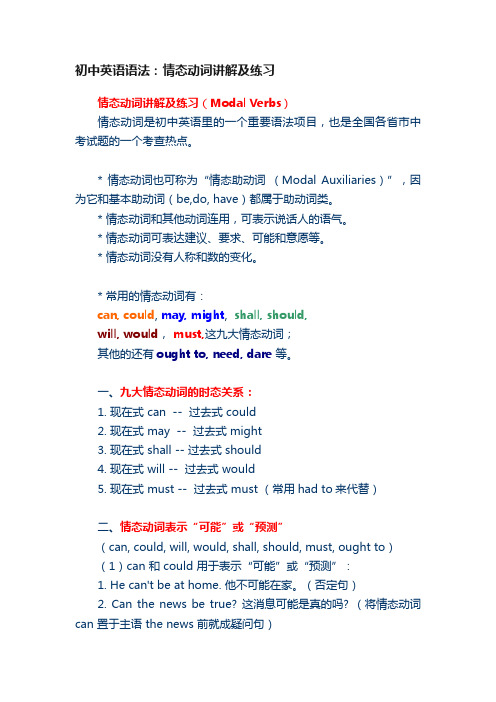
初中英语语法:情态动词讲解及练习情态动词讲解及练习(Modal Verbs)情态动词是初中英语里的一个重要语法项目,也是全国各省市中考试题的一个考查热点。
* 情态动词也可称为“情态助动词(Modal Auxiliaries)”,因为它和基本助动词(be,do, have)都属于助动词类。
* 情态动词和其他动词连用,可表示说话人的语气。
* 情态动词可表达建议、要求、可能和意愿等。
* 情态动词没有人称和数的变化。
* 常用的情态动词有:can, could, may, might, shall, should,will, would,must,这九大情态动词;其他的还有ought to, need, dare等。
一、九大情态动词的时态关系:1. 现在式 can -- 过去式 could2. 现在式 may -- 过去式 might3. 现在式 shall -- 过去式 should4. 现在式 will -- 过去式 would5. 现在式 must -- 过去式 must (常用had to来代替)二、情态动词表示“可能”或“预测”(can, could, will, would, shall, should, must, ought to)(1)can 和 could 用于表示“可能”或“预测”:1. He can't be at home. 他不可能在家。
(否定句)2. Can the news be true? 这消息可能是真的吗? (将情态动词can 置于主语 the news 前就成疑问句)3. Anybody can make mistake. 任何人都可能犯错误。
(只表示理论上的可能性)(2)may 和 might 用于表示“事实上的可能性”或“预测”:1. It may rain tomorrow. (表示可能会发生)明天可能会下雨。
2. It may snow later this afternoon. (表示预测)今天下午可能会下雪。
(完整word版)初一情态动词讲解及练习附答案
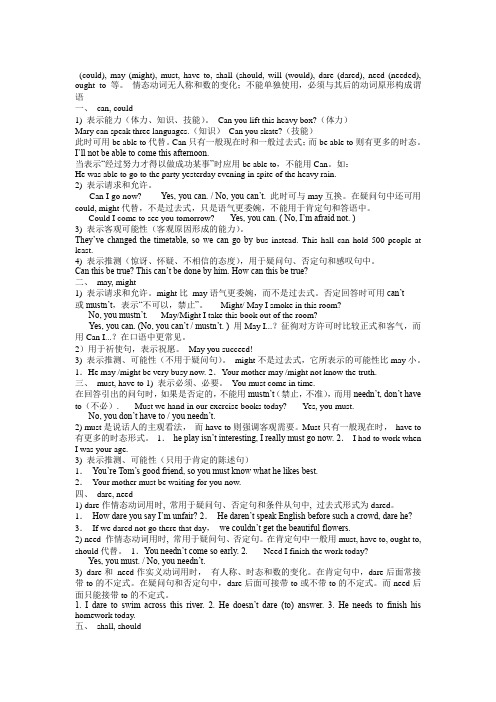
(could), may (might), must, have to, shall (should, will (would), dare (dared), need (needed), ought to等。
情态动词无人称和数的变化;不能单独使用,必须与其后的动词原形构成谓语一、can, could1) 表示能力(体力、知识、技能)。
Can you lift this heavy box?(体力)Mary can speak three languages.(知识)Can you skate?(技能)此时可用be able to代替。
Can只有一般现在时和一般过去式;而be able to则有更多的时态。
I’ll not be able to come this afternoon.当表示“经过努力才得以做成功某事”时应用be able to,不能用Can。
如:He was able to go to the party yesterday evening in spite of the heavy rain.2) 表示请求和允许。
-----Can I go now? ----- Yes, you can. / No, you can’t. 此时可与may互换。
在疑问句中还可用could, might代替,不是过去式,只是语气更委婉,不能用于肯定句和答语中。
---- Could I come to see you tomorrow? ---- Yes, you can. ( No, I’m afraid not. )3) 表示客观可能性(客观原因形成的能力)。
They’ve changed the timetable, so we can go by bus instead. This hall can hold 500 people at least.4) 表示推测(惊讶、怀疑、不相信的态度),用于疑问句、否定句和感叹句中。
《中考英语》初中英语语法知识—情态动词的知识点训练
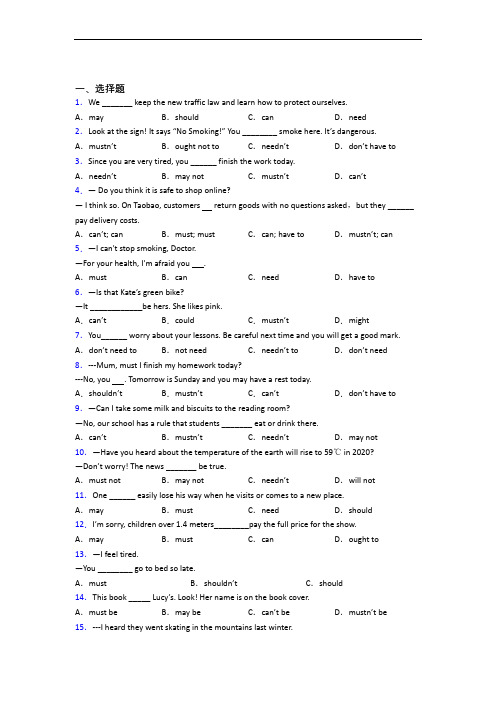
一、选择题1.We _______ keep the new traffic law and learn how to protect ourselves.A.may B.should C.can D.need2.Look at the sign! It says “No Smoking!” You ________ smoke here. It’s dangerous. A.mustn’t B.ought not to C.needn’t D.don’t have to 3.Since you are very tired, you ______ finish the work today.A.needn’t B.may not C.mustn’t D.can’t4.— Do you think it is safe to shop online?— I think so. On Taobao, customers return goods with no questions asked,but they ______ pay delivery costs.A.can’t; c an B.must; must C.can; have to D.mustn’t; can 5.―I can't stop smoking, Doctor.―For your health, I'm afraid you .A.must B.can C.need D.have to6.—Is that Kate’s green bike?—It ____________be hers. She likes pink.A.can’t B.could C.mustn’t D.might7.You______ worry about your lessons. Be careful next time and you will get a good mark. A.don’t need to B.not need C.needn’t to D.don’t need8.---Mum, must I finish my homework today?---No, you . Tomorrow is Sunday and you may have a rest today.A.shouldn’t B.mustn’t C.can’t D.don’t have to 9.—Can I take some milk and biscuits to the reading room?—No, our school has a rule that students _______ eat or drink there.A.can’t B.mustn’t C.needn’t D.may not 10.—Have you heard about the temperature of the earth will rise to 59℃ in 2020?—Don’t worry! The news _______ be true.A.must not B.may not C.needn’t D.will not 11.One ______ easily lose his way when he visits or comes to a new place.A.may B.must C.need D.should12.I’m sorry, children over 1.4 mete rs________pay the full price for the show.A.may B.must C.can D.ought to13.—I feel tired.—You ________ go to bed so late.A.must B.shouldn’t C.should14.This book _____ Lucy’s. Look! Her name is on the book cover.A.must be B.may be C.can’t be D.mustn’t be 15.---I heard they went skating in the mountains last winter.---It ______ true because there was little snow there.A.may not be B.won’t be C.couldn’t be D.will be16.一Hurry up, Mark! Let's cross the road as quickly as possible.一No,you . Don't you see the light is still red?A.couldn't B.wouldn't C.mustn't D.needn't17.—Is Wilson on duty in class today?—It________be him. It's his turn tomorrow.A.must B.can't C.should D.needn't 18.—Could you help me download some Taylor Swift’s songs from Ku Go u?—Sorry, people download music from the Internet without paying, because it’s against the law. A.wouldn’t B.needn’tC.mustn’t D.couldn’t19.一Already five people in the taxi, but the driver managed to take me as well.一Terrible, and it be an uncomfortable journey.A.can B.should C.must D.need20.— May I watch TV for a while?— No, you __________. You have to finish your homework first.A.can’t B.needn’t C.mustn’t D.won’t21.Even the top student can't work out this problem, so it________ be too difficult.A.must B.may C.can D.need 22.—Susan, someone is waiting for you on the phone. It_______ be your sister, but I’m not sure.—Oh, please tell her to call me_______ because I’m busy now.A.might; later B.must; later C.might; late D.must; late【参考答案】***试卷处理标记,请不要删除一、选择题1.B解析:B【解析】句意:我们应该遵守新的交通法规,学会保护自己。
- 1、下载文档前请自行甄别文档内容的完整性,平台不提供额外的编辑、内容补充、找答案等附加服务。
- 2、"仅部分预览"的文档,不可在线预览部分如存在完整性等问题,可反馈申请退款(可完整预览的文档不适用该条件!)。
- 3、如文档侵犯您的权益,请联系客服反馈,我们会尽快为您处理(人工客服工作时间:9:00-18:30)。
一、选择题1.We _______ keep the new traffic law and learn how to protect ourselves.A.may B.should C.can D.need 2.(2018·山东临沂) Could you please speak a little louder? I ______ hear you very well. A.can’t B.mustn’tC.shouldn’t D.needn’t3.I’ve bought a nice necklace for Jo’s birthday. She _____like it, but I’m not sure.A.can B.may be C.might D.must 4.—Is Wendy in the classroom now?—I’m not sure. She ________ be there. I saw her in the library ten minutes ago.A.may not B.must not C.shall not D.would not 5.You______ worry about your lessons. Be careful next time and you will get a good mark. A.don’t need to B.not need C.needn’t to D.don’t need 6.—Jenny, you _________ push your way onto the bus.—I’m really sorry about it.A.mustn’t B.needn’t C.may not7.— Mom, I got a big box from express(快递). What is it?—I’m not sure. It ________be a present from your grandmother.A.should B.might C.must D.will8.You __ drive your car so fast. It's very dangerous.A.wouldn't B.shouldn't C.couldn't D.mightn't 9.—Doesn’t Fra nk like staying at home and looking after his little sister?—_______, but he ________ because both of his parents work.A.Yes; has to B.No; has toC.Yes; doesn’t have to D.No; doesn’t have to10.You run with the train when it is coming. It’s dan gerous.A.may not B.mustn’t C.needn’t 11.—Look! Mrs. Smith is standing in front of the teaching building.—It______ her. She has gone to Egypt for her holiday.A.must be B.mustn’t be C.can be D.can’t be 12.—I often see Maria in the library, and she _________ like reading best.—That’s right.A.need B.may C.must D.can 13.This book _____ Lucy’s. Look! Her name is on the book cover.A.must be B.may be C.can’t be D.mustn’t be 14.The flowers ________ every day, or they will die.A.must water B.can be wateredC.should water D.must be watered15.Everyone______ be polite to their parents.A.could B.may C.should D.can16.–Is Mike coming to the fashion show tomorrow?--I’m not sure. He ______ not come.A.must B.can C.may D.should 17.—Mum, I’ve signed for a big box by Future Express (快递). What’s in it?—I’m not sure. It ________be a present from your brother.A.need B.must C.may D.will18.—Must I hand in my reports today?—No, you ________.A.mustn’t B.can’t C.shouldn’t D.don’t have to 19.— May I watch TV for a while?— No, you __________. You have to finish your homework first.A.can’t B.needn’t C.mustn’t D.won’t20.—We've prepared all kinds of foods for the picnic.—Do you mean I___ bring anything?A.can't B.needn't C.mustn't D.won't 21.—Who is the lady over there? Is it Miss Wang?—It __________be her. Miss Wang is much taller.A.needn't B.mustn't C.shouldn't D.can't22.—Can you come to my party on Saturday afternoon?—Sorry, I can’t. I ________ meet my friends.A.can’t B.might have to C.needn’t【参考答案】***试卷处理标记,请不要删除一、选择题1.B解析:B【解析】句意:我们应该遵守新的交通法规,学会保护自己。
A. may可以;B. should应该;C. can 能,可以;D. need需要。
建议对方做某事一般用情态动词should,故答案为B。
2.A解析:A【解析】【详解】句意:请你说大点声好吗?我不能很好地听到你说的话。
考查情态动词辨析。
can't不能,表示不能够;mustn't不许,表禁止;shouldn’t不应该,表劝诫;needn’t无需,表示没必要。
本句表示“不能够”,根据句意语境,可知BCD三项意思都与句意不合,故选A。
3.C解析:C【解析】【详解】句意:乔的生日我给她买了一条漂亮的项链。
她可能会喜欢,但是我不确定。
考查情态动词表示推测。
can表示能、可以;may表示可能,might是其过去式;must表示一定、必须。
根据题干中but I'm not sure.可知可能性较小的推测,则可用may或者might,B项中may后有系动词be,原句中有动词like,则只能用might。
故选C。
4.A解析:A【解析】【详解】句意:—温迪现在在教室吗?—我不确定。
她可能不在那里,十分钟前我在图书馆见过她。
考查情态动词表推测。
may not可能不;must not一定不要;shall not将不会;would not将要、会、就会,表示虚拟、假设、条件等。
根据回答句“I’m not sure”,可推测后句应该是说:她可能不在那里。
是对现在情况的推测,may not“可能不”。
故选A。
5.A解析:A【解析】【详解】句意:你不必担心你的功课。
下次小心点,你会取得好成绩的。
考查动词need用法辨析。
need用作情态动词时常和不带to的不定式一起作谓语,否定式是将not置于其后,并有其否定的缩写形式needn't,在疑问和否定句中不加助动词;可知BCD三项表达错误。
用作行为动词时,need是一个普通的及物动词,用在肯定、否定和疑问句中均可,接不定式时要带to。
本句need用作及物动词,根据句意结构,故选A。
6.A解析:A【解析】【详解】句意:——Jenny,你一定不要挤上公共汽车。
——对此我真的很抱歉。
考查情态动词。
mustn’t禁止;needn’t不需要;may not可能不。
根据you ___ push your way onto the bus.结合常识,可知是一定禁止挤上公共汽车,应该用mustn’t,故答案选A。
7.B解析:B【解析】【详解】句意:——妈妈,我从快递公司收到了一个大箱子。
它是什么?——我不确定。
可能是你祖母送的礼物。
考查情态动词。
should应该;might可能;must必须; will将,会。
根据“I’m not sure”可知下文是没有把握的肯定推测。
根据题意,故选B。
8.B解析:B【解析】【分析】【详解】句意:你不应该开车这么快。
太危险了。
考查情态动词。
wouldn't不会;shouldn't不应该,表建议;couldn't不能,表不许可; mightn't不可能,表示否定性推测。
根据下文It's very dangerous.可知不应该开车这么快,故选B。
9.B解析:B【解析】【详解】句意:——难道弗莱克不喜欢待在家里照顾他的小妹妹吗?——是的,但是他不得不这么做因为他的父母都去工作了。
考查一般疑问句。
has to不得不;doesn’t have to不必。
根据后面的both of his parents work 可知,弗兰克不得不在家照顾妹妹。
而且but表示转折,跟前面表述的是相反的,问句是一个否定式的一般疑问句,回答“No+否定句”,no翻译成“是的”。
故选B。
10.B解析:B【解析】【详解】句意:火车来的时候你不能跟它一起跑,这很危险。
考查情态动词。
